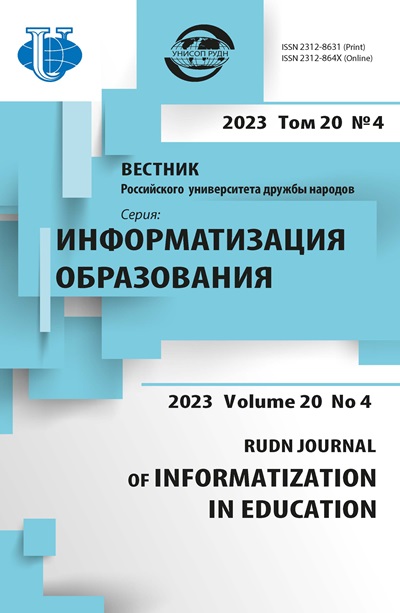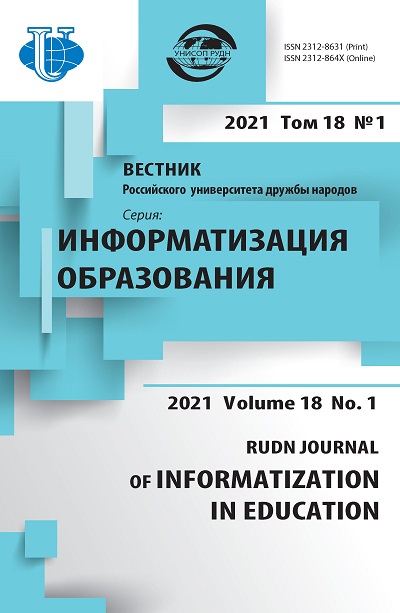Analysis of the development efficiency of the Moscow Electronic School resources by future computer science teachers on the basis of practical training sites
- Authors: Sadykova A.R.1, Levchenko I.V.1, Kartashova L.I.1
-
Affiliations:
- Moscow City University
- Issue: Vol 18, No 1 (2021)
- Pages: 45-61
- Section: TEACHING COMPUTER SCIENCE
- URL: https://journals.rudn.ru/informatization-education/article/view/26279
- DOI: https://doi.org/10.22363/2312-8631-2021-18-1-45-61
Cite item
Full Text
Abstract
Problem and goal. The practical (pedagogical) training sites based on Moscow schools in the context of effective development of the resources of the Moscow Electronic School by future computer science teachers are analyzed. The goal is to identify the correlation of the digital footprint obtained as a result of the development of the school network activity index based on data on the actions of teachers and students in e-learning environments and of educational organizations identification corresponding to this index, as well as the methodological activity of schools in Moscow - the bases of practical (pedagogical) training of future computer science teachers. Methodology. The analysis of regulatory documents and the database of Moscow schools, where the Moscow City University students of the “Computer Science” direction are engaged in practical (pedagogical) training, reflection on the content of the knowledge obtained, search for criteria for selecting basic schools for conducting practical (pedagogical) training of future computer science teachers, local pedagogical experiment were used. Results. It was found out that the activity of schools in the development and use of educational resources of the Moscow Electronic School is not a prerequisite for cooperation with these schools. At the same time, the knowledge of information technologies, including the technology of working with the resources of the Moscow Electronic School, by future subject teachers, is an integral part of the professional competence of a modern teacher, and especially a computer science teacher. Conclusion. The basic criteria for selecting sites for industrial practices of future computer science teachers, in particular students of the Moscow City University, are proposed. The formulated criteria for selecting basic schools for conducting practical (pedagogical) training of university students will allow them to successfully solve the tasks set for this type of educational activity, achieve their goals and form professional and pedagogical competencies.
About the authors
Albina R. Sadykova
Moscow City University
Author for correspondence.
Email: albsad2008@yandex.ru
Doctor of Pedagogical Sciences, Associate Professor, Head of the Department of Computer Science, Management and Technology
28 Sheremetyevskaya St, Moscow, 127521, Russian FederationIrina V. Levchenko
Moscow City University
Email: ira-lev@yandex.ru
Doctor of Pedagogical Sciences, Full Professor, Professor of the Department of Informatics, Management and Technology
28 Sheremetyevskaya St, Moscow, 127521, Russian FederationLyudmila I. Kartashova
Moscow City University
Email: ludmila_kart@mail.ru
Candidate of Pedagogical Sciences, Associate Professor, Associate Professor of the Department of Informatics, Management and Technology
28 Sheremetyevskaya St, Moscow, 127521, Russian FederationReferences
- Abdurazakov MM, Aziyeva JH, Romanov PYu, Sadykova AR. Teachers IT competence structure and content in the field of cloud computing. The European Proceedings of Social & Behavioural Sciences. 2017:1–8.
- Pavlova AE. Particularities of distance learning in view of the theory of generations. Vestnik of Moscow City University. Series: Informatics and Informatization of Education. 2012;1(23):65–70. (In Russ.)
- Tamoshina ND. Internet technologies in school education. Vestnik of Moscow City University. Series: Informatics and Informatization of Education. 2006;2(7):158–159. (In Russ.)
- Kartashova LI. The periods of formation and development of cognitive interests of learners with use of information technologies. Bulletin of People’s Friendship University of Russia. Series: Informatization in Education. 2009;(3):55–60. (In Russ.)
- Levchenko IV. Methodical training of the teacher to use in lessons of information technology. Vestnik of Moscow City University. Series: Informatics and Informatization of Education. 2007;1(8):62–66. (In Russ.)
- Levchenko IV. Professional and pedagogical activity of teachers of informatics in the conditions of fundamentalization of education. Vestnik of Moscow City University. Series: Informatics and Informatization of Education. 2008;3(13):39–46. (In Russ.)
- Levchenko IV, Kartashova LI. Training of teachers to form students' cognitive interests by means of information and communication technologies. Bulletin of Peoples’ Friendship University of Russia. Series: Informatization in Education. 2006;(1):20–23. (In Russ.)
- Levchenko IV. Methodical training of teachers of informatics in the conditions of informatization of higher professional education. Vestnik of Moscow City University. Series: Informatics and Informatization of Education. 2007;2(10):38–45. (In Russ.)
- Levchenko IV, Sadykova AR. Approaches to solving the problem of search of scenarios of lessons on informatics for basic school in the Moscow E-School library. RUDN Journal of Informatization in Education. 2019;16(3):231–242. (In Russ.)
- Sadykova AR. Evristicheskij komponent v professional'noj deyatel'nosti prepodavatelya: teoriya, metodika, praktika [Heuristic component in the professional activity of a teacher: theory, methodology, practice]. Moscow; 2010. (In Russ.)
- Korzhuev AV, Babaskin VS, Sadykova AR. Reflexion as a strategy in the process of life-long pedagogical education. Higher education in Russia. 2013;(7):77–80. (In Russ.)
- Korzhuev AV, Sadykova AR. Pedagogicheskij poisk: vremya peremen [Pedagogical search: time of changes]. Moscow; 2018. (In Russ.)
- Patarakin ED, Vachkova SN. Network analysis of collective actions on digital educational objects. Vestnik of Moscow City University. Series: Pedagogy and Psychology. 2019;4(50):101–112. (In Russ.)
- Patarakin E, Burov V, Yarmakhov B. computational pedagogy: thinking, participation, reflection. Digital Turn in Schools – Research, Policy, Practice. Lecture Notes in Educational Technology. 2019:123–137. https://doi.org/10.1007/978-981-13-7361-9_9
- Kupriyanov RB, Lavrenova EV, Patarakin ED, Yarmakhov BB. A recommendation system for building school teachers’ multidisciplinary skills. European Proceedings of Social and Behavioural Sciences. 2020;95:1212–1221.
















